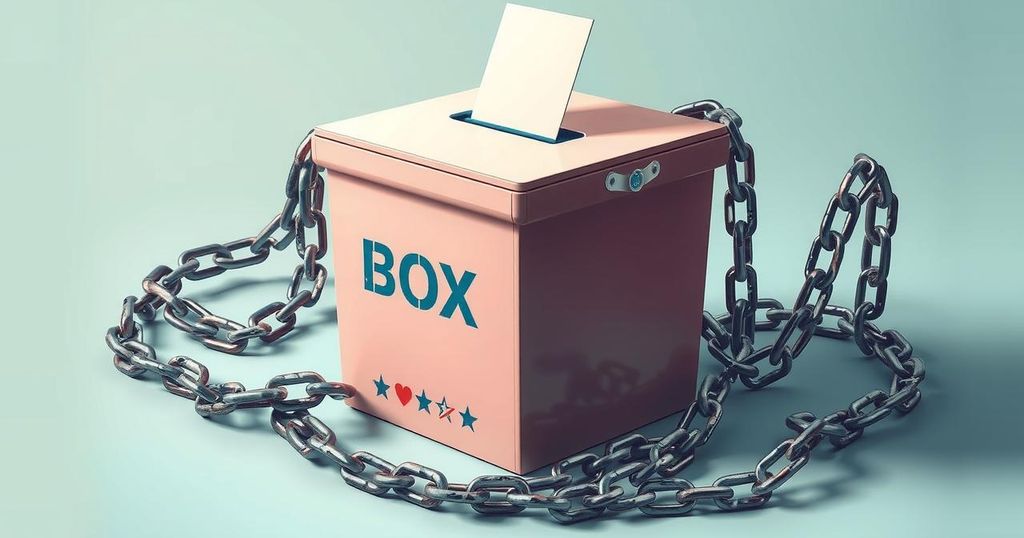Compulsory Voting in Nigeria: A Misguided Approach to Civic Participation
The introduction of Nigeria’s Compulsory Voting Bill raises concerns about punishing non-voters while overlooking the issue of election rigging. Critics argue that it underscores a troubling disconnect between lawmakers and citizens. The article highlights the need for electoral reform, advocating for transparency and integrity rather than coercion to restore public trust.
In recent discussions surrounding Nigeria’s political landscape, the phrase “Nigeria can happen to anybody” encapsulates a bitter truth for many citizens. A new legislative proposal, the ‘Compulsory Voting Bill’, has emerged as a focal point of contention, with critics arguing that the bill criminalizes non-voting while failing to address the pressing issue of electoral malpractice. This reality exposes a system where disenfranchisement runs deep, complicating the relationship between citizens and their elected leaders.
Instead of prioritizing initiatives aimed at curbing election rigging—an act many Nigerians would welcome—lawmakers are advancing a misguided proposal that many see as draconian. At a time when accusations of election fraud and voter suppression overshadow the electoral process, it is bewildering that the energy of lawmakers seems directed towards enforcing compulsory participation instead of pursuing justice and integrity for electoral systems.
This situation sheds light on a disturbing trend: a growing disconnect between the political elite and ordinary Nigerians. An environment where citizens are legally penalized for opting out of a flawed voting process while those who actively undermine democracy roam free suggests a deeply misaligned sense of justice. Punishing individuals for choosing not to vote, while allowing electoral abusers to thrive, signals troubling times ahead for democracy in Nigeria.
Voting, undoubtedly, is a civic obligation essential for shaping national governance. Yet, enforcing participation through threats of imprisonment is akin to state coercion. Such actions cannot instill genuine patriotism, which must be built on principles of trust, accountability, and effective governance.
In a nation experiencing persistent electoral irregularities and where the integrity of the Independent National Electoral Commission is under constant scrutiny, it strikes as grossly unfair to penalize those disheartened individuals who feel betrayed by the electoral process. With many voters facing obstacles like delayed materials, polling violence, and systemic manipulation, criminalizing non-voters only magnifies the injustice.
Rather than working to ensure transparency and inclusivity within the electoral process, the proposal moves towards authoritarian measures that threaten the democratic fabric itself. This approach invites a confusion of civic responsibility with coercion, effectively undermining genuine democratic participation.
It is imperative to reflect on the real culprits eroding Nigeria’s democratic foundations. Election riggers—the individuals who facilitate fraud, misuse violence, and manipulate voting processes—continue to operate undeterred. Meanwhile, innocent citizens simply opting out of voting due to disillusionment face potential jail time, illustrating grave injustices within the system.
This hypocrisy is systemic. The judiciary is often either too compromised or powerless to ensure accountability, while law enforcement engages selectively based on political allegiances. Legislative bodies may not hold themselves accountable, perpetuating a cycle where ordinary citizens bear the brunt of legal ramifications for passive dissent, while economic elites evade justice with impunity.
Historical trends in recent elections showcase widespread electoral abuses that remain largely unchecked. Reports of bribery, intimidation at polling stations, and ballot box tampering abound, resulting in minimal legal repercussions for offenders. Yet, the prospect of punishing those who decline to vote amidst such chaos reveals a grossly disproportionate system of justice.
Disenfranchised citizens, often caught in the crossfire of political malpractice, cannot be the scapegoats for a system that remains fundamentally broken. It would be unjust to imprison someone lacking faith in voting when systemic barriers undermine their right to participate.
In conclusion, Nigeria’s political landscape necessitates urgent reform rather than the proposed punitive measures for non-voters. Advocating for free, fair, and credible elections is crucial, especially when citizens need to see their votes hold weight in the political process. The government should capture the essence of democracy by prioritizing integrity and accountability over coercion.
Ultimately, forward motion in Nigeria’s democracy hinges on restoring hope, belief, and trust in the system itself. Until the country shifts its focus from punishing the disillusioned to truly uplifting its electorate, democracy will remain in a precarious state, and many will continue to face the tragic reality of what it means for “Nigeria to happen to them.”,
Nigeria’s proposal for compulsory voting raises significant questions about the integrity and fairness of its electoral system. As citizens face potential imprisonment for opting out of voting, the real issues of electoral malpractice and corruption remain largely unaddressed. Acknowledging the broader disillusionment among voters is essential. To improve voter turnout and rebuild trust, the focus should be on ensuring free and fair elections, not on coercive measures. Until genuine reforms are enacted, the future of democracy in Nigeria appears increasingly bleak.
Original Source: thesouthernexaminer.com




Post Comment